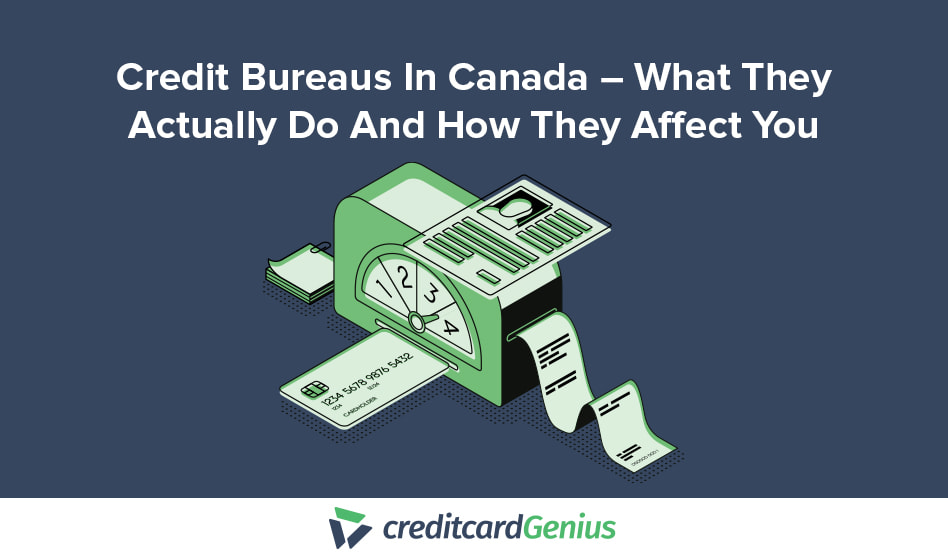You know your credit score is important, but how much do you know about the credit bureaus in Canada that generate that score? Technically, you have a few credit scores – one from each credit monitoring bureau.
TransUnion and Equifax collect financial data about you to generate a credit score that reflects how you handle your finances. Since lenders and credit card issuers use these details to make decisions, it’s important to learn about how the bureaus gather and use your information.
Here's a thorough guide to how the Canadian credit bureaus work.
Key Takeaways
- Equifax and TransUnion are the two credit monitoring bureaus in Canada.
- You can access your credit information from both bureaus for free.
- Both bureaus offer credit monitoring packages that give you more access to your financial information and identity theft protection.
Never miss an amazing deal again + get our bonus 250+ page eBook for FREE. Join 50,000 other Canadians who receive our weekly newsletter – learn more.
What is a credit bureau?
A credit bureau is a company that compiles and stores information about your credit products.
How do credit bureaus get their info?
Financial institutions, such as banks and credit unions, provide various details to credit bureaus. The bureaus also obtain information from courthouses and collection agencies.
The first time a bank submits information about you, a credit file is created under your name and linked to your social insurance number.
What info gets reported to the bureaus?
The bureaus update your file over time as lenders provide information about the accounts you have open. These details can include whether you're making your payments on time, the amount of credit you have, and how long your accounts have been open.
They'll also track whether any lender has made a "hard check" on your file.
This information is then used by lenders when you apply for credit products, such as credit cards, loans, and mortgages.
Many lenders are interested in your credit score. Your credit score is a number between 300 and 900 that the credit bureaus generate after running your financial information through an algorithm.
Generally speaking, anything above 760 is considered an excellent credit score. If your score is less than 660, you may run into issues getting approved, or you may end up getting loans with higher interest rates.
Are they regulated?
Credit bureaus are regulated at the federal level by the Personal Information Protection and Electronic Documents Act (PIPEDA) and by legislation at the provincial level.
These bureaus are required to give you access to your file at least once per year, but they aren't required to provide your score. This is an important detail.
You should check your file periodically and, if there's a mistake in it, request that it be corrected. If you're a victim of identity theft, you can view any products you didn't open and hopefully resolve the issue before your credit score takes a hit.
Depending on the bureau, they'll charge you for getting your score – and they'll happily sell you credit monitoring. After all, if anyone opens an account in your name or conducts a hard check, they'll immediately know and can inform you. If it wasn't you, you can report the problem right away.
Credit bureaus in Canada
In Canada, there are two major credit bureaus: Equifax and TransUnion.
Equifax
Equifax is an American company that operates credit bureaus in 25 countries around the world, with Canada being one of them.
Equifax provides free access to both your credit file and score, updated once per month. Quebec residents can also activate a credit lock on their accounts.
Although you’re likely to get the information you need for free, you can pay $24.95 per month for Equifax's full credit monitoring, Equifax Complete Premier. This service includes daily updates of your score and file, identity theft coverage, and help from ID restoration specialists.
TransUnion
The other major bureau in Canada is TransUnion. Like Equifax, they also operate in many countries around the world, although they’re based in Burlington, ON.
They're a bit more cautious when accessing your credit file and score. First, they won't provide you with your credit score for free. TransUnion only provides monthly access to your credit file for free.
To get your score, you'll have to pony up for their credit monitoring service, which costs $24.95 per month. If you just want one-time access, you can cancel it afterwards, but it's an extra step you'll have to take.
We should mention that if you decide to keep the credit monitoring subscription, you’ll get nice perks like identity theft coverage and email alerts. Still, customer service reviews aren’t great, and there’s no mobile app.
Why are TransUnion and Equifax credit scores different?
There are a few reasons you might get different scores:
- They use different algorithms: Both bureaus look at the same data, but each uses its own scoring formula to interpret it.
- They have different access to information: Lenders and financial institutions don’t necessarily report to both bureaus.
- They update scores on different days: Equifax tends to update scores at least once a month, while TransUnion updates every 45 days or so.
- They make mistakes: If you notice a big difference between scores, it might be because one bureau has the wrong information.
How you can check your credit score for free
Your credit score and file are important. Your file should be checked regularly to ensure it doesn't contain errors.
There are other ways to check your credit score beyond going straight to the bureaus themselves. Here's a rundown of your options:
Borrowell and Credit Karma
Borrowell and Credit Karma are two advertising agencies that offer free access to your credit score and file.
Borrowell lets you access your Equifax file, and Credit Karma Canada grants you access to TransUnion.
However, your access comes at a cost. You'll be bombarded with ads and emails to sign up for one of their products, so be aware of that before you decide to use one of these services.
A bank account with a major bank
The major banks offer access to your credit file from one of the credit bureaus. The only exception to this is TD. But if you have a bank account with CIBC, BMO, Scotiabank, or RBC, you'll get free access just by having an account.
Here are some accounts that have this feature from Scotiabank.
FAQ
What is a credit bureau?
A credit bureau is an organization that collects information related to any credit products you have or had, as well as details like bankruptcies and consumer proposals. Financial institutions submit this information to the credit bureaus, which store it.
What credit bureaus are there in Canada?
There are two major credit bureaus in Canada: Equifax and TransUnion. These institutions gather similar information, but weigh the details of your finances differently, which is why there can be a slight variation between scores.
How can I contact a credit bureau?
There are a few ways you can reach Equifax, including by mail, online chat, or by calling 1-800-871-3250 during various hours. There are also three ways to contact TransUnion: via online chat, mail, or by calling 1-800-663-9980 during various hours.
Is 700 a good credit score?
Yes, this is a very good score. When you look at the average credit score in Canada, you’ll see that anything over 660 is considered good, so if you have a score of 700, you're doing very well.
Is it true that after 7 years, your credit is clear?
No, this isn't quite true. Positive information stays in your file for 10-20 years, while negative information is kept for up to six years (seven, in cases of bankruptcy). Negative details may disappear, but your score is never completely wiped clean.
creditcardGenius is the only tool that compares 126+ features of 228 Canadian credit cards using math-based ratings and rankings that respond to your needs, instantly. Take our quiz and see which of Canada's 228 cards is for you.





 $100 GeniusCash
$100 GeniusCash





 GC:
GC: 


































Comments
Leave a comment
Required fields are marked with *. Your email address will not be published.